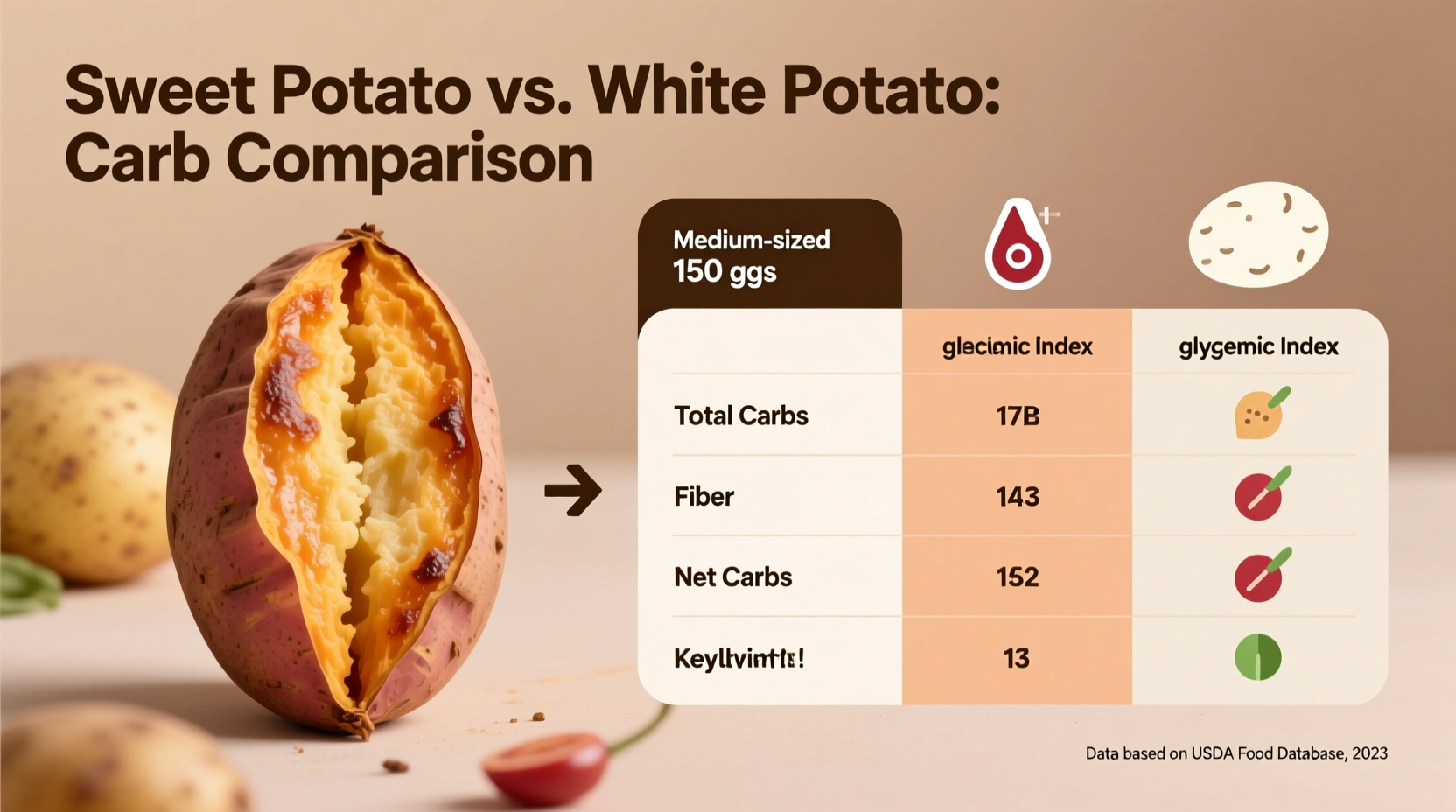Understanding Sweet Potato Carbohydrates: A Complete Breakdown
When you're tracking your carbohydrate intake for health, fitness, or dietary management, knowing exactly what you're consuming matters. Sweet potatoes often appear on "healthy carb" lists, but let's examine the precise nutritional profile that makes them a smart choice for most eating patterns.
Carbohydrate Composition of Sweet Potatoes
Carbohydrates in sweet potatoes aren't just simple sugars—they consist of multiple components that affect how your body processes them. Understanding this breakdown helps you make informed dietary decisions based on your specific health goals.
| Carb Component | Amount per Medium Sweet Potato (130g) | Amount per 100g |
|---|---|---|
| Total Carbohydrates | 27g | 20.7g |
| Dietary Fiber | 5g | 3.8g |
| Sugars | 7g | 5.4g |
| Starch | 15g | 11.5g |
| Net Carbs (Total Carbs - Fiber) | 22g | 16.9g |
This detailed breakdown comes from the USDA FoodData Central database, the most authoritative source for nutritional information in the United States. The fiber content is particularly noteworthy, as it represents nearly 20% of the recommended daily fiber intake.
How Sweet Potato Carbs Compare to Other Common Foods
Context matters when evaluating carbohydrate content. Here's how sweet potatoes stack up against other common carbohydrate sources:
| Food Item | Carbohydrates per 100g | Fiber Content | Glycemic Index |
|---|---|---|---|
| Sweet Potato (baked) | 20.7g | 3.8g | 63 |
| White Potato (baked) | 17.5g | 2.2g | 82 |
| White Rice (cooked) | 28.7g | 0.4g | 73 |
| Quinoa (cooked) | 21.3g | 2.8g | 53 |
| Whole Wheat Bread | 41.5g | 6.0g | 69 |
While sweet potatoes contain slightly more carbohydrates per 100g than white potatoes, they offer significantly more fiber and nutrients while having a lower glycemic index. This means they cause a more gradual rise in blood sugar compared to many other carbohydrate sources.

Practical Considerations for Different Dietary Needs
Understanding how sweet potato carbohydrates fit into various eating patterns helps you make informed choices based on your specific health goals:
For Blood Sugar Management
Sweet potatoes have a moderate glycemic index of 63, which is considerably lower than white potatoes (82). Research published in the Journal of Nutrition and Metabolism indicates that the fiber and complex starch structure in sweet potatoes contribute to more stable blood glucose responses compared to refined carbohydrates. For optimal blood sugar management, pair sweet potatoes with protein and healthy fats.
For Weight Management
The high fiber content in sweet potatoes promotes satiety, helping you feel full longer. A study from Harvard T.H. Chan School of Public Health notes that high-fiber foods like sweet potatoes can support weight management by reducing overall calorie intake through increased fullness.
For Active Individuals and Athletes
The complex carbohydrates in sweet potatoes provide sustained energy release, making them an excellent pre-workout food. The natural sugars offer quick energy while the starch provides longer-lasting fuel. Many athletes incorporate sweet potatoes into their meal planning for this balanced energy profile.
Factors That Affect Sweet Potato Carb Content
Several variables influence the carbohydrate composition of sweet potatoes:
- Preparation method: Baking concentrates natural sugars, while boiling may leach some carbohydrates into the water
- Variety: Orange-fleshed varieties (like Beauregard) have different carb profiles than purple or white varieties
- Ripeness: As sweet potatoes mature, starch converts to sugars, increasing the sugar content
- Size: Always measure by weight rather than count for accurate carb tracking
Maximizing Nutritional Benefits While Managing Carbs
Here are practical strategies for incorporating sweet potatoes into various eating patterns:
- For lower net carbs: Eat sweet potatoes with the skin on to maximize fiber content (skin contains nearly half the fiber)
- For better blood sugar response: Cool cooked sweet potatoes before eating—this increases resistant starch content
- Portion control: A standard serving for carb counting is 130g (about 1 medium sweet potato), providing approximately 27g total carbs
- Pairing strategy: Combine with healthy fats (like olive oil or avocado) and protein to slow carbohydrate absorption
Common Misconceptions About Sweet Potato Carbs
Several myths persist about sweet potato carbohydrates that deserve clarification:
- "Sweet potatoes are too high in sugar for diabetics" - While they contain natural sugars, their fiber content and moderate glycemic index make them suitable for most diabetes meal plans when portion-controlled
- "All orange sweet potatoes are the same nutritionally" - Different varieties have varying carb compositions; Japanese sweet potatoes, for example, have a lower glycemic index
- "Sweet potatoes will make you gain weight" - Like any food, sweet potatoes contribute to weight gain only when consumed in excess of calorie needs
When Sweet Potatoes Might Not Fit Your Dietary Needs
While sweet potatoes offer numerous health benefits, certain dietary approaches may require limiting them:
- Very low-carb/ketogenic diets: At 20.7g carbs per 100g, sweet potatoes exceed typical keto limits (20-50g total carbs daily)
- Specific digestive conditions: People with FODMAP sensitivities may need to limit sweet potatoes due to their mannitol content
- Post-bariatric surgery diets: May require modified carbohydrate sources during initial recovery phases
For those following strict low-carb protocols, consider smaller portions of sweet potatoes or opting for lower-carb vegetables like cauliflower or zucchini as alternatives.
Final Thoughts on Sweet Potato Carbohydrates
Sweet potatoes provide a nutrient-dense carbohydrate source with valuable fiber, vitamins, and minerals. With approximately 27g of total carbohydrates in a medium-sized sweet potato (130g), they offer a balanced energy profile suitable for most healthy eating patterns when consumed in appropriate portions. The key is understanding how they fit into your overall dietary pattern and health goals rather than focusing solely on the carbohydrate number.











 浙公网安备
33010002000092号
浙公网安备
33010002000092号 浙B2-20120091-4
浙B2-20120091-4